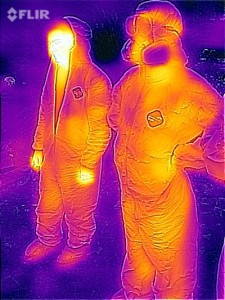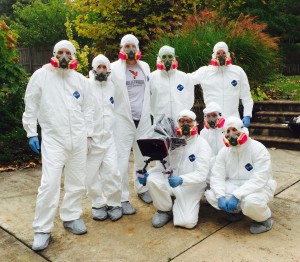Way back when, when I had a boss (let’s call him “Former Bossâ€), his wife and I were talking at the premiere of one of my company’s movies about how Former Boss and I would probably be great friends if he weren’t my boss. She laughed and said if circumstances were different, they would be probably be double-dating on a regular basis with my then-boyfriend and me. Former Boss and I had a lot in common. We did fun kinda-friend things like pooling together our money once a month to order artisanal imported tea. I admired his photography so much that I facilitated an exhibit of his work at an art gallery. We had the same goofy sense of humor and could make each other laugh with an eyebrow lift over something someone said in a production meeting. Over the 13+ years we worked together, we mastered the balance of “you are cool, I like you†energy with the necessary boss/employee deference often required by big company politics. That deference meant that I was always a bit guarded, in the sense that sometimes I felt like I was playing a role at work and was never 100% authentically me. I think that almost-friendship with Former Boss is why it flat out blindsided me when, during the Great Recession of 2009, I was not only in the first wave of my company’s lay-offs, but I was the very first person Former Boss laid off. I never heard from him again. That stung for a long time.
In the five years since I lost my job, I’ve worked very hard to live an authentic life. That’s because in my quest for shama (inner-peace), I’ve learned that the single-most important truth that leads to happiness is embracing my authentic self and never making excuses for those distinctive quirks that define me. That’s sometimes a hard thing to do, but it does get easier with practice.  These days I’m pretty comfortable with being authentic in my personal life. However I’m still using training wheels with learning to be fully-authentic in the workplace. That became very clear recently on the set of a documentary I’m currently producing. I was the only female on our film crew. Over a period of 4 months, we spent long hours together as we filmed in many states throughout the country. When you spend that much time on the road with a bunch of testosterone, you sorta become one of the guys. Plus as a producer, I was one of the bosses, meaning I found myself in a similar situation I had with Former Boss, but from the other side. I’d like to think I’m a little more approachable than the typical boss, but the fact of the matter is that when you are in charge of a film set, you are always aware that you are the boss. You have to be. You are paid to make sure that things run smoothly and on time.
Being authentic in the workplace never became more of an exercise in truth than during one day in September when we were filming in New York. The subject of the documentary is toxic mold, a topic that hits pretty close to home because I became very ill over a decade ago when I lived in a Venice Beach house that had hidden black mold growing in the walls. I’m lucky that I long ago recovered my health. That’s why what happened one morning on Coney Island was completely unexpected. We were filming a beachfront house in which the first floor had been flooded to the ceiling by Hurricane Sandy. We were told the house had been remediated for mold, but what we didn’t realize until later is that the drywall had never been replaced, meaning the sopping wet drywall has been a perfect breeding ground for toxic mold to secretly grow behind the paint for the past two years. I walked into the first floor of the house and within minutes my entire body started shaking. I immediately walked outside and the shaking grew worse, my heart started racing, I had trouble breathing and an intense brain fog immediately settled in. Luckily the executive producer of the film was there, and being an expert on mold, he knew exactly what was happening to me (since I didn’t have a clue) and knew what to do about it. My body was having a PTSD response – it recognized that mold was there, even if I consciously didn’t, and was having a sort of panic attack.
This all happened in front of the film crew, and in front of the executive producer, who is basically my boss. My first reaction was complete and utter horror.  I suppose I had been extra concerned with not showing vulnerability in the workplace given I was the only woman and I’ve worked hard to earn respect. But in retrospect I realize how ridiculous that knee-jerk response was. That’s because being authentic requires being vulnerable. You can’t be authentic without being vulnerable. And you can’t be vulnerable without being authentic. The two traits go hand in hand.
 Later that same day we filmed a remediation of a home that we knew had been overrun by toxic mold. No one on the film crew complained when we all dressed in protective biohazard suits. And everyone on the crew took the time to ask me if I was feeling okay, especially the executive producer. By that point I had surrendered to the fact that I’m sensitive to mold and there was no way I could power through and fake that I’m not.  And interestingly, I think I grew closer to the crew, and to the executive producer, as a result of the experience.
Later that same day we filmed a remediation of a home that we knew had been overrun by toxic mold. No one on the film crew complained when we all dressed in protective biohazard suits. And everyone on the crew took the time to ask me if I was feeling okay, especially the executive producer. By that point I had surrendered to the fact that I’m sensitive to mold and there was no way I could power through and fake that I’m not.  And interestingly, I think I grew closer to the crew, and to the executive producer, as a result of the experience.
A month after the Coney Island incident I was in Los Angeles for a lunch meeting. When I walked into the restaurant I came face to face with Former Boss. It has been five years since he laid me off, and we were both a bit startled to see the other. I nervously talked with him and really couldn’t tell you what either of us said. It was like running into an ex-boyfriend who unceremoniously dumped you. You dream of the day when you’ll see each other and imagine that he’ll look at you and wonder how he ever let you go, but instead your voice shakes and you ramble on like a blathering idiot.
Running into Former Boss made me realize that I was never truly authentic when I worked with him. I was always concerned with playing the role of the perfect employee, and because of that I always had my guard up.  A week later I sent him an e-mail and told him how much I enjoyed seeing him after all these years. He never responded. But weirdly I’m fine with not hearing back.  I think owning the insecurity I felt with seeing him is an important step to healing the hurt and making peace with losing my job. It’s clear that our kinda-friendship was never destined to become a real friendship outside of the workplace. But I’m okay with that, because my experiences over the past few months have taught me that my training wheels with being authentic in the workplace are finally ready to come off.

Comments on this entry are closed.